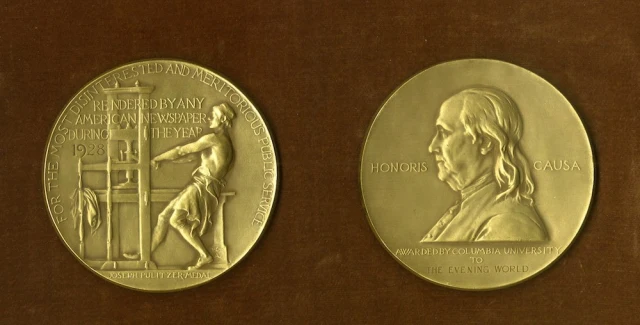
When Sewell Chan was fired by the Columbia Journalism Review last month for reasons that have not been adequately explained, he wrote on social media about a sensitive story that was in the works. He said he had what he described as “pointed conversations” with three staff members. Here’s how he described one of those conversations:
[It] was with an editor who has been working for weeks on a sensitive MeToo investigation I launched about sexual harassment by a prominent investigative reporter. Following a legal review of that story, I urged her to share her draft to the dean so that we could move expeditiously toward publication. She asked for more time, to which I reluctantly acceded. The story remains unpublished.
Those of us who are media obsessives assumed he was referring to former Washington Post reporter Wesley Lowery, a Pulitzer Prize winner. In March, Lowery was the subject of a tough article in his former paper (gift link), written by Will Sommer, alleging that he had left his job at American University over allegations that he’d made “inappropriate sexual comments in private meetings with students and unwanted sexual advances and actions toward journalists.”
On Wednesday, the story that Chan had alluded to finally dropped. And it is truly the stuff that nightmares are made of. Betsy Morais, named interim editor of the Columbia Journalism Review after Chan’s firing, reports that Lowery engaged in a pattern of serious sexual misconduct while he was at American University, with several women saying that Lowery had pressured them into sex or sexually assaulted them after he plied them with alcohol. It is a deeply disturbing story. Lowery would not speak with CJR, but he did give Morais a statement that I can only describe as unparseable. It says in part:
CJR’s portrayal of these periods in my personal life is incomplete and includes false insinuations about complicated dynamics. Still, I respect the women who have shared their experiences and take their perspectives seriously. As a young professional, I did not always recognize the power imbalances that surfaced as personal relationships evolved into professional ones, and vice versa.
He adds that he has since “committed to sobriety.”
This would be a tragedy in any case, especially for the women he allegedly victimized. But it’s also a tragedy because of what Lowery represents. He is a prominent Black journalist who has been outspoken about the ways that traditional notions of objectivity have served to reinforce the status quo with regard to race and gender — both within media organizations and in how the news is covered.
I know Lowery slightly and, until recently, counted myself among his admirers. I interviewed him briefly for my 2018 book “The Return of the Moguls.” I’ve emailed back and forth with him about which of his books I should assign my ethics students. I’ve assigned his essays on objectivity as well as the video of a panel discussion he took part in on that topic hosted by the Columbia Journalism School, which is the home of CJR.
It is a real loss that his voice will no longer be heard. And no, I won’t be assigning his work anymore. There are times when it’s just too difficult to separate the writer from what they have written.
Lowery worked for The Boston Globe about a dozen years ago, and when editor Marty Baron left to become executive editor of The Washington Post, Lowery followed not long after. He wrote an important book about the first wave of Black Lives Matter demonstrations, “They Can’t Kill Us All,” and he helped the Post build a widely praised database of people who had been killed by police officers.
But it is Lowery’s critique of objectivity that was uniquely valuable. I don’t agree with him entirely — as Walter Lippmann originally conceived of objectivity, it is the fair-minded, evidence-based pursuit of the truth, not mindless balance, which is the way it is often caricatured. And I don’t really think Lowery disagrees with Lippmann.
At the beginning of each semester, I’ve asked my ethics students to read an op-ed piece (gift link) that Lowery wrote for The New York Times in 2020 headlined “A Reckoning Over Objectivity, Led by Black Journalists,” and to watch an address that Baron delivered at Brandeis in 2023 called “In Defense of Objectivity.”
What’s striking is that Lowery’s and Baron’s views aren’t really that far apart, even though their clashes over Lowery’s outspokenness on social media led to Lowery’s departure from the Post.
Now Lowery has been silenced — has silenced himself. The debate over journalistic ethics, objectivity and race will be poorer without his contributions. I am not saying he deserves any special treatment for the terrible behavior of which he’s been accused. I am saying that his critique of how journalists do their work will be missed.
I realize that, in lamenting the loss of Lowery’s voice, I haven’t given voice to any of the women quoted in the CJR story. So I’m going to close with a thread on Bluesky written by Olivia Messer, the editor-in-chief of Barbed Wire, who told CJR a harrowing tale of being sexually assaulted by Lowery.
Messer also says that she was interviewed, on the record, for the article that Sommer wrote for The Washington Post and that her comments did not make it into print. Sommer has since left the Post for The Bulwark. So it sounds like there are still some loose ends to be tied up.
Here is what she posted last night:
Some of y’all noticed I’ve been uncharacteristically offline. This is why, and I remain on leave for a few weeks to handle a PTSD relapse. CJR was dogged in its pursuit of my story. Because of what I do and who I am, I felt that I had to answer their questions honestly.www.cjr.org/feature-2/we…
— Olivia Messer (@oliviamesser.bsky.social) 2025-05-21T17:17:28.955Z
I wouldn’t wish this on anyone, but I also believe it was a chance to prove that I mean what I say to the women who have trusted me with theirs. I have to believe that there’s power in telling the truth — and in journalism.
— Olivia Messer (@oliviamesser.bsky.social) 2025-05-21T17:17:53.850Z
I’m really really overwhelmed by the messages of support — and the multiple journalists who’ve DMed me about their similar experiences with him. It’s going to take time to get back to everyone, but I deeply appreciate it and am filled with just immense gratitude and relief.
— Olivia Messer (@oliviamesser.bsky.social) 2025-05-21T19:43:02.150Z








